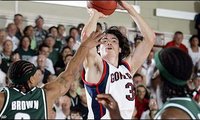This is an excerpt from Shane Dieke's blog, movementseverywhererant.blogspot.com.
Yesterday I had the privilege of spending some time with Steve Douglass - el presidente of Campus Crusade for Christ. Steve spent some time with our national leadership team.One of the questions we asked Steve (I think it was Sam Osterloh) was, "In the history of Crusade, what was the best year of the campus ministry (best meaning missional / exciting / effective)? " Of course Steve answered . . . . it is still in our future - the best is yet to come.But as we pushed him, he nailed it down to 1967-1970. Here are the six things he said were true of this dynamic period.
Expectant: There was an expectation of God working. You could feel the electricity in the air - nothing was too big for God to accomplish - and we expected him to do so.
Simple: The tools were simple, well taught and used effectively. You quickly learned and then were expected (even called) to action and reproduction. You went to campus and you knew exactly what was expected and what you needed to do.
Consistent: Everyone was on the same page. Simple, transferable and universally used.
H.S.: "We talked about the work of the Holy Spirit much more than we do today." Everythings was about the movement of the Spirit - conversations flowed from what the Spirit was doing. (so much so that many people thought we were a charasmatic group).
Student Ownership: "I owned it - and so did my roomates. Not that we did it perfectly, but we deeply owned it and were allowed to run."
Quick Turn Around: After someone trusted Christ they were out sharing the next day. You could become a new believer and be teaching basic lessons in less than three weeks.
Interestingly, Steve said that maybe only 30% of the whole of Crusade was operating at this high octain (he was gueussing and speculating), but it was enough to dirve a huge level of work, excitement and resources for the Great Commission.
As I look at thoses six . . . . well, it does not seem that complex. Again, Steve was answering off the top of his head, so I am not sure he would identify this as THE SIX THINGS - but it is telling to see the organic nature of movement in this simple list.

 It took three overtimes to decide the contest between Gonzaga and Michigan St.(picked by many to compete for the national championship). If you missed this game you missed one of the best games I've ever seen. Gonzaga prevailed 109-106. Adam Morrison (product of Mead High in Spokane) scored 43 points
It took three overtimes to decide the contest between Gonzaga and Michigan St.(picked by many to compete for the national championship). If you missed this game you missed one of the best games I've ever seen. Gonzaga prevailed 109-106. Adam Morrison (product of Mead High in Spokane) scored 43 points